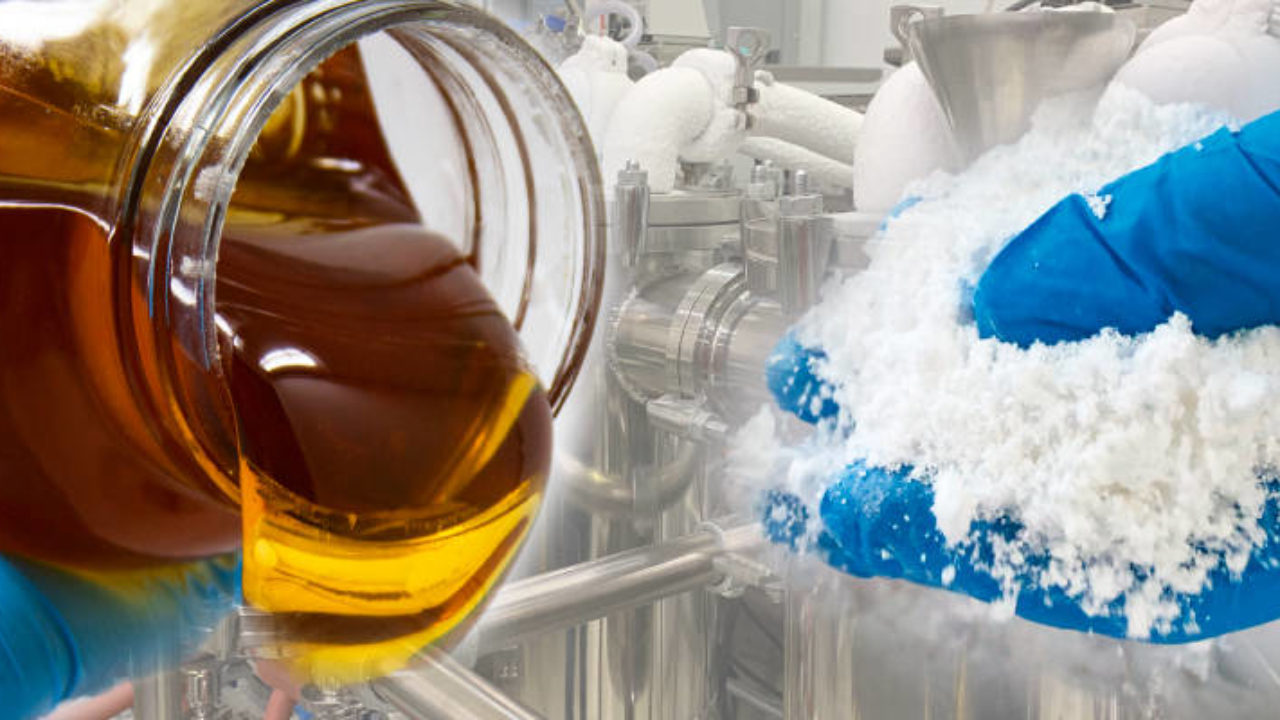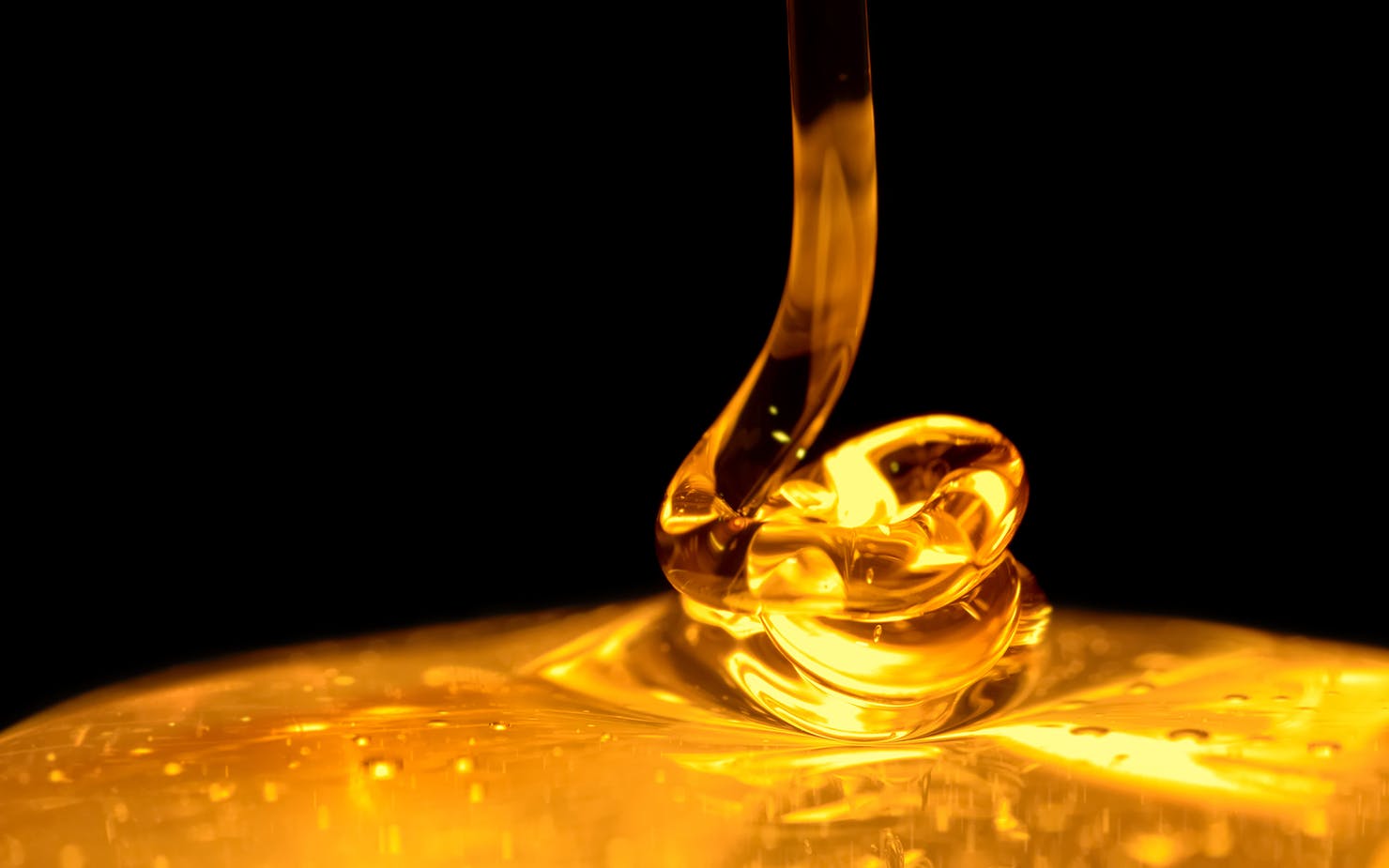To determine the most suitable precursor for your application, one must be informed on the differences between CBD Distillate and a CBD Isolate.
Most would lean towards a CBD Distillate compound, and due to It’s vast array of naturally occurring elements that are found in a Hemp plant. CBD Isolate is oftentimes defined as a cannabinoid oil in It’s purest form. Both are true, but keep in mind your application and product purpose. Of course one would want to create the best product out there, and discerning between these two CBD forms is crucial to your success.
CBD Distillate is a rich and refined hemp derived compound in a viscous amber liquid.
So let’s see the differences.

What Are the Key Differences?
You might say that CBD Distillate is preferable because it contains an array of compounds found naturally in the hemp plant. Or you could argue that CBD Isolate is cannabidiol in its purest, most predictable form. Both are true.
What’s best for your brand? Find out how Distillate differs from isolate and why one may be better suited to your intention than the other.
What Is CBD Distillate?
CBD Distillate is rich in refined CBD, accompanied by minor cannabinoids, terpenes and flavonoids which produce a phenomenon known as the “entourage effect”. Dr. Ethan Russo popularized the term entourage effect. This suggests a synergistic relationship between CBD and other beneficial compounds that naturally occur in a Cannabis plant. Orchestrating this synergy to suit your intended purpose will ultimately determine the effectiveness of your product. With the exception of psychcoactive elements, the broad spectrum CBD Distillates feature trace amounts of THC known as psychocannabinoid THC, and these cannabinoid elements are intentionally retained. Both full spectrum and broad spectrum CBD Distillates will feature minor amounts known as cannibanoids CBC (cannabichromene) and CBG (cannabigerol). Inclusion and exclusion of these elements will be determined by your product manufacturer and It’s intended purpose.

What is CBD Isolate?
Unlike CBD Distillate, CBD Isolate is just like it sounds; isolating the desired elements to suit your needs, and the exclusion of all other compounds with the exception of cannabidiol that is present in a hemp flower. Producers utilize an array of processes to separate CBD from the other occurring compounds. This includes solvent extraction which utilizes Butane Propane, Ethanol or Carbon Dioxide (C02). Extraction and refinement may also include Chromatography. The desired end result is a clean and crystallized white powder substance.
Isolate vs. Distillate, and which of these is most suitable for your application. If your goal is an earthy hemp-derived profile, a CBD Distillate is the direction you will want to take. Keep in mind that CBD in Distillate form will have undetectable levels of THC. In the interest of legal conformity, non-psychoatctive compounds have been reduced to trace amounts while retaining the desired and well rounded bouquet of hemp-derived compounds in a viscous amber liquid.
To capitalize on the enormous potential of CBD without the association and risks involved with THC, an Isolate will be your best selection. Although CBD Isolate in itself will not provide the previously defined benefits known as the entourage effect, it is well known that CBD has many advantages. Many end users are attracted to It’s purity, the subtle hint of hemp aroma, novelty tastes, and various scents and sensations that can be derived from an Isolate.
Are you still unsure as to which form is most suitable for you ? Perhaps the following additional information will help in your decision. Many factors are involved, and this includes the temperature at which your product is processed, compatibility and nature of other ingredients added, intended use of the product, desired taste and texture and the brand ethos of your target consumer. It is crucial that you take all of these factors into consideration before you make the choice of Distillate vs. Isolate. Both versions are completely free of undesirables such as pesticides, herbicides, fungicides, heavy metals and residual manufacturing solvents and impurities. No need to be alarmed.
Define your parameters and summarize your precise specifications before your final decision on Distillate vs. Isolate, and check the test results to confirm!

So what’s next ?
CBD Clinic Care is a pioneer in the industry. Our years of experience and expertise in product development, marketing, distribution and sales will provide guidance in your product success. Forthcoming honesty and gainful advice is available anytime. An email away, and please reach out to one of our enthusiastic company representatives. Thank you for your consideration.
As the sun sets on warmer weather, it’s time to start prepping for the cold. As you start to pull out the hoodies and boots you may also want to think about adding CBD to your cold weather arsenal.
From dry skin to joint pain and even that dreaded winter cold, using CBD in the winter has a ton of benefits you may not be aware of—yet. CBD works with the body’s Endocannabinoid System (ECS), a group of receptors in our bodies’ central nervous system that specifically interact with cannabinoids (like CBD) to maintain homeostasis throughout the body. The ECS supports a healthy physical and mental balance—especially important in the winter months.
So how does CBD benefit us in the colder seasons? We’ve gathered information on how to prep for winter with CBD.

CBD for low mood and winter blues
The longer nights, lack of sunlight and lowered exposure to Vitamin D all have negative impacts on our mood. In fact, 2-3% of the Canadian population also suffer from Seasonal Affective Disorder (SAD) in the winter months. This type of depression is common and can usually be treated naturally with light therapy, Vitamin D supplements and exercise to help boost those natural endorphins. If you experience symptoms of SAD such as poor sleep, moodiness, or lack of energy beyond the winter months, it may be best to seek professional medical help. SAD is very common among adults and can be treated naturally—in fact, CBD helps with moodiness, anxiety and lack of sleep in the colder months thanks to its ability to interact with the body’s ECS as mentioned above.
As the central nervous system helps regulate our body’s hormones (such as cortisol, the stress hormone, or melatonin, the sleep hormone) CBD works with the ECS to regulate hormone-related issues. This is one of the reasons why CBD is so effective for those who suffer from anxiety and sleep disorders. By creating that feeling of homeostasis for mental and physical balance, CBD helps to relax the body and mind, making sleep easier to achieve and keeping low mood, anxiety and depression at bay for more rest.

CBD for dry winter skin
As we head in to winter, you may already be seeing signs of dry skin on your hands or face. In the winter, many of us notice flaky, cracked and irritated skin. It can be enough to make you self-conscious during holiday party season.
But something you can use to help soothe and moisturize your skin is cannabidiol (CBD). One study found that CBD helps regulate our skin’s oil production. Too much oil leads to acne, while too little oil can lead not only to dry skin, but to conditions like eczema. But many use CBD as a means to combat inflammation and help reduce skin discomfort and pain. And not only does CBD soothe dry skin, but it can also help alleviate associated pain.
Some moisturizers only work on particular skin types, whereas CBD can be applied to all kinds of skin. It doesn’t matter if your skin is naturally dry, flaky or oily, or if you battle acne. CBD is all natural. For most people, CBD doesn’t produce any allergic reactions or breakouts. The only thing to consider is other ingredients in topical CBD that may cause irritations or breakouts.

Full spectrum CBD to boost your immune system
As we enter into winter cold and flu season, it’s time to stock up on remedies to help when you’re under the weather. With all the buzz around cannabidiol (CBD), should you consider adding CBD as part of your home remedy cold/flu kit to help relieve symptoms such as a sore throat, stuffy nose, and body pain?
According to Philip Blair, M.D., the answer is unequivocally yes. “Flu causes inflammation throughout the body,” Blair says. “CBD helps control the inflammation and reduce the symptoms we experience. In addition, CBD helps with the aches and pains as well as speeding recovery.” Furthermore, CBD can help you get to sleep and stay asleep, a benefit given how your sleep cycle is often altered when you get sick.
The type of CBD you consume can also impact the type of benefits your body will retain as well as the boost your immune system will need in the colder months. Full spectrum CBD, for example, is a ‘whole plant’ extract that contains not only CBD, but all of the other cannabinoids, amino acids and essential oils found within the plant. These compounds have various benefits and work together to produce what is commonly known as the “entourage effect”, which essentially means an increase in efficacy.
Studies have shown that full spectrum CBD products also offer higher levels of relief from inflammation, pain and anxiety, as compared to other types of CBD like CBD Isolate products.
When considering CBD for winter, do some research on the type of CBD that would work best for the ailments you’re trying to treat. If naturally boosting your overall immune system is your goal, full spectrum CBD products may best help you achieve the benefits you’re looking for in the winter months.
While these are some of the most common winter-induced challenges our bodies go through in the winter, CBD has the type of benefits that last all year long. Whether it’s to reduce pain, improve sleep, relieve anxiety, or treat inflamed, itchy skin, incorporating CBD products into your health routine won’t just give your body a boost in the winter but may just create a lasting benefit throughout the seasons.




